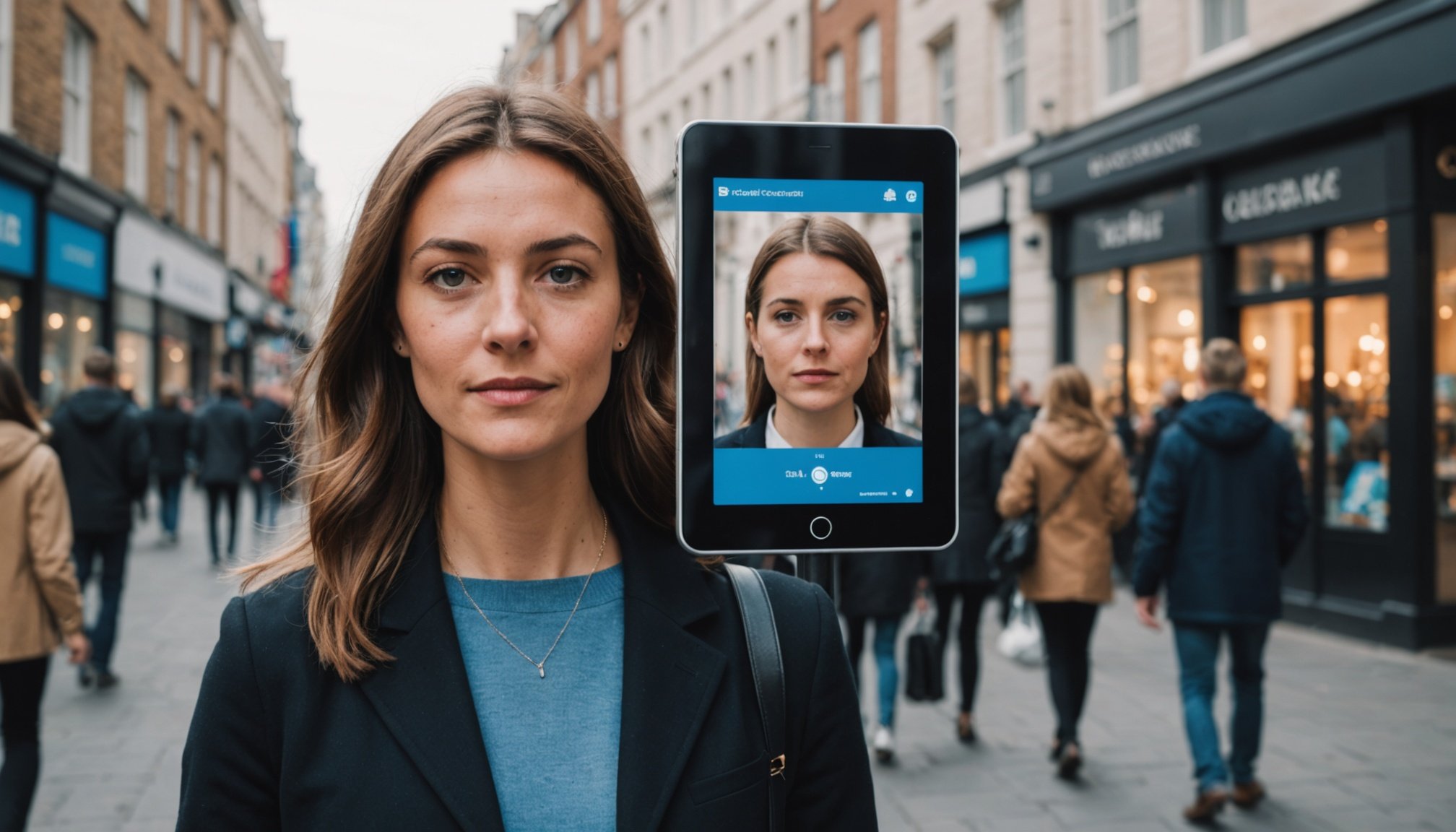Understanding UK Retail’s Facial Recognition Laws: Crucial Impacts and Key Considerations
As we step into 2025, the UK retail sector is on the cusp of a significant technological shift, particularly with the integration of facial recognition technology. This advancement, while promising in terms of security and efficiency, raises a plethora of questions and concerns regarding privacy, legal compliance, and ethical implications. Here’s a detailed look at the current state of facial recognition laws in UK retail, along with the key considerations and impacts.
The Rise of Facial Recognition in UK Retail
Facial recognition technology is not new, but its adoption in the retail sector is gaining momentum, especially in the context of combating retail theft and ensuring age verification for alcohol sales.
In parallel : Essential Legal Considerations for UK Businesses Hosting International Trade Shows
How Facial Recognition Works
Facial recognition technology uses artificial intelligence (AI) algorithms to analyze an individual’s facial features to confirm or deny their identity. In retail settings, cameras are installed around the store, particularly focusing on high-value products, to capture the facial biometrics of every customer who enters. This data is then compared to a pre-existing database of known offenders. Once a match is made, the system sends an alert to the security team, providing real-time and database photos of the individual[2].
Legal Framework and Compliance
The use of facial recognition in UK retail is subject to a robust legal framework that aims to balance security needs with individual privacy rights.
Also to read : Navigating UK Partnership Dissolution: The Ultimate Legal Guide for Mastery
Data Protection and Privacy
The UK’s data protection laws, aligned with the EU’s General Data Protection Regulation (GDPR), play a crucial role in regulating the use of facial recognition technology. Businesses must ensure that the collection, storage, and processing of biometric data comply with these laws. This includes obtaining explicit consent from individuals, ensuring data is anonymized and encrypted, and displaying clear signage indicating the use of facial recognition technology[2].
Key Legal Considerations:
- **Consent**: Explicit consent must be obtained from individuals before collecting their biometric data.
- **Data Protection**: Compliance with GDPR and UK data protection laws is mandatory.
- **Transparency**: Clear signage must be displayed to inform customers about the use of facial recognition technology.
- **Encryption**: Biometric data must be anonymized and encrypted to protect privacy.
Public Perception and Trust
Public trust is a critical factor in the successful implementation of facial recognition technology in retail.
Building Trust Through Transparency
Retailers who adopt facial recognition technology must prioritize transparency to strengthen trust and loyalty with their customer base. This involves clearly communicating how the technology works, its benefits, and the measures taken to protect customer privacy. For example, Amazon faced legal issues for failing to inform customers about the use of biometric technology, highlighting the importance of transparency[2].
Steps to Build Trust:
- **Clear Communication**: Explain the purpose and benefits of facial recognition technology.
- **Signage**: Display clear signs indicating the use of facial recognition.
- **Privacy Measures**: Ensure customers understand the measures taken to protect their privacy.
- **Feedback Mechanisms**: Provide channels for customers to give feedback and raise concerns.
Comparison with Other Countries
The approach to facial recognition and digital IDs varies significantly across different countries, offering valuable insights into different models of implementation.
UK vs. Istanbul: Different Approaches to Age Verification
In the UK, the focus is on voluntary digital IDs for age verification in alcohol sales, using QR codes or contactless technology. This approach is part of a broader digital transformation strategy that emphasizes convenience and security while maintaining traditional identification methods as an option[1][3].
In contrast, Istanbul has made the use of facial recognition technology compulsory for businesses selling alcohol and cigarettes. This involves installing cameras that can record high-quality footage even in low-light conditions and storing biometric data for at least a month. While the goal is to protect minors, critics argue that this approach erodes privacy through intrusive surveillance[3][4].
| Country | Technology Used | Implementation | Privacy Concerns |
|---|---|---|---|
| UK | Digital IDs (QR codes/contactless) | Voluntary, part of broader digital transformation | Emphasis on privacy protection, traditional IDs still accepted |
| Istanbul | Facial Recognition | Compulsory, biometric data storage | Significant privacy concerns, intrusive surveillance |
Practical Considerations and Challenges
Implementing facial recognition technology is not without its challenges, particularly in terms of technical issues, staff training, and ensuring seamless customer experience.
Technical Issues and Backup Systems
Businesses must be prepared to handle technical issues such as app glitches or connectivity problems without compromising customer privacy. This includes implementing backup systems to ensure efficient service. For example, universities that have implemented similar systems can provide valuable lessons on managing these challenges[1].
Staff Training and Integration
The transition to using facial recognition technology requires significant staff training. Pub, club, and retail staff need to adapt from checking physical IDs to verifying age through QR codes or contactless technology. Clear guidelines and user-friendly tools are essential for proper implementation[1].
Ethical and Human Rights Implications
The use of facial recognition technology raises important ethical and human rights questions.
Human Rights and Fundamental Freedoms
The use of facial recognition in public spaces can be seen as an infringement on fundamental rights, such as the right to privacy and freedom from surveillance. It is crucial to ensure that such technologies do not create an unacceptable risk to human rights. The UK’s approach, which emphasizes voluntary use and robust data protection measures, is designed to mitigate these risks[2][3].
Ethical Considerations:
- **Human Rights**: Ensure the technology does not infringe on the right to privacy and freedom from surveillance.
- **Fundamental Freedoms**: Balance security needs with individual freedoms.
- **Risk Assessment**: Conduct thorough risk assessments to identify and mitigate potential human rights violations.
Future Trends and Recommendations
As we look to the future, several trends and recommendations emerge for the effective and ethical use of facial recognition technology in UK retail.
Adoption of New Technologies
The adoption of cloud-based access control systems and other new technologies is set to accelerate. These systems offer scalability, flexibility, and remote management capabilities, which can enhance the security and efficiency of facial recognition systems[5].
Rule of Law and Surveillance
The use of facial recognition technology must always be within the bounds of the law. This includes ensuring that surveillance is proportionate and necessary, and that individuals are informed about the use of such technology. Transparency and consent are key to maintaining public trust and complying with legal standards[2].
The integration of facial recognition technology in UK retail is a complex issue that involves balancing security needs with individual privacy rights. As the UK moves forward with this technology, it is crucial to prioritize transparency, ensure robust data protection measures, and address the ethical and human rights implications.
By understanding the legal framework, public perception, and practical considerations, retailers can implement facial recognition technology in a way that enhances security without compromising the trust and privacy of their customers.
Key Takeaways:
- **Transparency**: Clear communication and signage are essential.
- **Data Protection**: Compliance with GDPR and UK data protection laws is mandatory.
- **Ethical Considerations**: Ensure the technology does not infringe on human rights.
- **Staff Training**: Proper training is necessary for seamless implementation.
- **Technical Preparedness**: Backup systems should be in place to handle technical issues.
As we navigate this new landscape, it is important to remember that technology should serve to enhance our lives while respecting our fundamental rights and freedoms.











